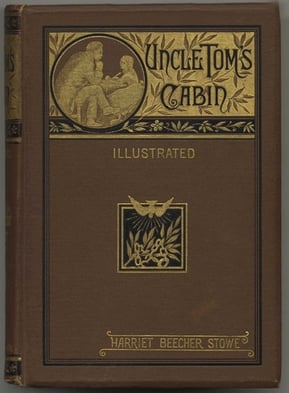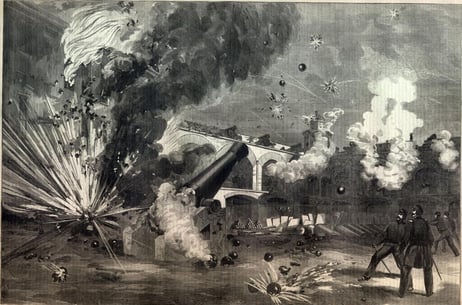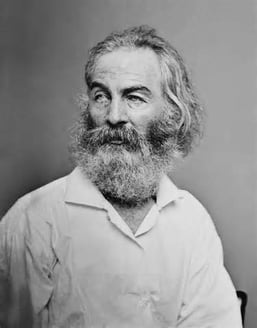Today marks the anniversary of the start of the Civil War. It began on April 12, 1861 after months of political tension and declarations of secession. It came to a head when the North and South were first brought to conflict at Fort Sumter, a Union base by Charleston, South Carolina. From these fires raged years of bloodshed and war—forming the most harrowing period in the nation’s history. But you probably knew this already.
 What bears consideration too is the role the written word played during the Civil War. We know of the battles and politics, but the books, writings, and speeches are just as important in illuminating this significant time. In fact, the war would have never happened if it wasn’t for a book.
What bears consideration too is the role the written word played during the Civil War. We know of the battles and politics, but the books, writings, and speeches are just as important in illuminating this significant time. In fact, the war would have never happened if it wasn’t for a book.
At least that’s what Abraham Lincoln claimed when the president met Harriet Beecher Stowe, author of Uncle Tom’s Cabin, whom he accredited with starting the entire war. Beecher Stowe’s novel, which dramatized the horrors of slavery, invigorated the cause of abolitionism in the country. To this day, the novel stands as one of the most provocative cases that art really can change the world.
Sharp Tongues
William Lloyd Garrison, founder of The Liberator newspaper, was thoroughly unapologetic and vehement in his abolitionism. Even some who disliked slavery also disliked his fiery rhetoric, which was seen as too incendiary for a delicate time. Nonetheless, he continued to spread his message with unwavering nerve, demanding that no one stand idle in this most urgent time. Garrison continued his crusade until the very end, dissolving The Liberator at the end of the war, in 1865.
Essential to abolitionist thought during the war were freed and escaped slaves like Frederick Douglass and Sojourner Truth. Both spoke to the horrors of slavery with an eloquence that only experience could provide.
Opposite these detractors were defenders of the Confederate way of life and keeping fellow man in bondage. James Ryder Randall was an eminent voice of Dixie exaltation. In his most famous lyric, entitled “Maryland, My Maryland,” he makes his full allegiance known:
She is not dead, nor deaf, nor dumb
Huzza! She spurns the Northern scum!
She breathes! She burns! She comes! She comes!
During the Civil War, one could find rhetoric as hostile and antagonistic as the marching troops of the battlefield.
Women and the First-Person Narrative
Diaries and first-person narratives came aplenty from the Civil War. The war, in uprooting the social order, also gave women a more proper eminence. And indeed some of the finest memoirs and diaries were written by women during the period.
Mary Chesnut was an upper class woman of Southern plantation society. She was deeply familiar with the attitudes and ethos of her eroding milieu. She gives us a detailed perspective as both an insider and closeted-abolitionist. She too witnessed key parts of war, and witnessed some of the first shots fired at Fort Sumter. For her perspective and sensitivity, she is considered by some scholars to be the finest Confederate writer.
 Some of the most dramatic narratives of the time come from the likes of female spies. Belle Boyd wrote her memoir, Bell Boyd in Camp and Prison, about her various missions and perils of the war. After the dust settled, she even enjoyed a lucrative lecture tour, in which she recounted her experience as a secret agent in the country’s most fatal conflict.
Some of the most dramatic narratives of the time come from the likes of female spies. Belle Boyd wrote her memoir, Bell Boyd in Camp and Prison, about her various missions and perils of the war. After the dust settled, she even enjoyed a lucrative lecture tour, in which she recounted her experience as a secret agent in the country’s most fatal conflict.
On the Union side, Sarah Emma Edmonds’ memoir, The Female Spy of the Union Army: The thrilling adventures, experiences and escapes of a woman as nurse spy, and scout, in hospitals, camps, and battle-fields, proves a zany account of wartime activity. In one instance, she goes to a house in Confederate Virginia to pick up fruit and provisions, only to engage in a shootout with the grocery woman, with whom she becomes an unlikely friend. Edmonds also impersonated a black man to sneak across Confederate lines. Extreme times, we find, have given us strange stories.
Classic Authors and the War
 Perhaps the most vital form of writing during the way was poetry. A time of battle songs and funerary laments, of despair and celebration, there was something about the Civil War that lent itself to verse. Herman Melville wrote a collection of poems called Battle-Pieces and Aspects of the War in 1866, compiling many of his thoughts of the not quite settled conflict. A Northerner, Melville’s verse is surprisingly reverent and measured, relaying to us a turbulent time with an impartial eye and scrutiny.
Perhaps the most vital form of writing during the way was poetry. A time of battle songs and funerary laments, of despair and celebration, there was something about the Civil War that lent itself to verse. Herman Melville wrote a collection of poems called Battle-Pieces and Aspects of the War in 1866, compiling many of his thoughts of the not quite settled conflict. A Northerner, Melville’s verse is surprisingly reverent and measured, relaying to us a turbulent time with an impartial eye and scrutiny.
But the great writer of the Civil War is Walt Whitman. Whitman was thoroughly invested in the war. His brother, George Washington Whitman, was wounded in battle (albeit not seriously) and was later captured by Confederate soldiers. Not really the type to take up arms, Whitman’s involvement in the war consisted of traveling to hospitals and charities that aided wounded soldiers and lives devastated by the violence. He tells us about his philanthropy in his Civil War collection, Drum Taps
The hurt and wounded I pacify with soothing hand,
I sit by the restless all the dark night - some are so young,
Some suffer so much - I recall the experience sweet and sad,
(Many a soldier’s loving arms about this neck have cross’d and rested,
Many a soldier’s kiss dwells on these bearded lips.)
Whitman displayed his investment both in the humanistic and political sides of war. It is impossible to ignore his threnodies for his beloved Lincoln in the likes of "O Captain! My Captain!" and he heavily revised "When Lilacs Last in the Dooryard Bloom’d."
The poet’s nuanced versed is an eminent example from a period of conflict and righteousness, ambivalence and fury, and we must turn to literature if we hope to better understand the most extreme and significant of times.









